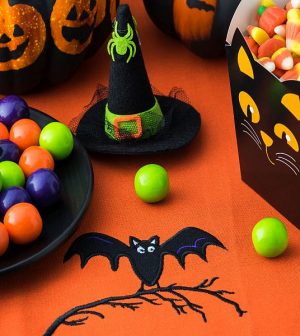- Could Your Grocery Store Meat Be Causing Recurring UTIs?
- Are You Making This Expensive Thermostat Error This Winter?
- Recognizing the Signs of Hypothyroidism
- 10 Strategies to Overcome Insomnia
- Could Artificial Sweeteners Be Aging the Brain Faster?
- Techniques for Soothing Your Nervous System
- Does the Water in Your House Smell Funny? Here’s Why
- Can a Daily Dose of Apple Cider Vinegar Actually Aid Weight Loss?
- 6 Health Beverages That Can Actually Spike Your Blood Sugar
- Treatment Options for Social Anxiety Disorder
Halloween Can Be Frightful for Kids With Allergies, Asthma

Allergies and asthma can turn Halloween into fright night, so parents must be vigilant.
Some fun-sized candy bars have no labels to alert about possible food allergens, such as peanuts, said Dr. Todd Mahr, president of the American College of Allergy, Asthma and Immunology.
But food allergens aren’t the only potential concerns.
“Halloween happens in the fall, so trick or treating involves being aware of fall allergies,” Mahr said in a college news release.
Ragweed and other types of pollen can trigger fall allergies. Keep pollen out of your house by leaving shoes at the door, and having children shower, wash hair and change clothes after they’ve been outdoors. Kids who take allergy meds should continue their medications for two weeks after the first frost, Mahr advised.
A sudden change in weather can trigger an asthma attack. If it’s cold on Halloween, consider an extra layer under or over the costume for children with asthma.
Dry, windy weather is bad for people with allergies, because the wind spreads pollen and mold. Monitor pollen forecasts to see if there will be high levels of pollen in the air on Halloween. If so, consider taking allergy medications.
Be cautious about haunted houses if your child has asthma. Fear and other intense emotions can disrupt normal breathing patterns, which can trigger asthma.
Many haunted houses also have smoke machines, and smoke of any kind is dangerous for those with asthma. If you do go to a haunted house, bring inhalers, Mahr recommended.
Better yet, instead of going to a haunted house, consider hosting your own Halloween party.
More information
The American Academy of Pediatrics has more on allergies and asthma.
Source: HealthDay
Copyright © 2026 HealthDay. All rights reserved.










